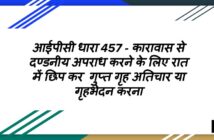In this article, we will discuss what a confession is, how it differs from admission, what are the types of confessions, what is the effect of confession in criminal investigation, under what circumstances is a confession admissible or inadmissible and the evidentiary value of the Section 164 statement.
What is Confession?
Section 24 – 30 of the Indian Evidence Act deals with a confession. There is no specific definition of confession. However, confession’s meaning can be drawn from the inference of admission. Admission of commission of an offence is called confession. In other words, a statement made by an accused that he has committed a crime or is guilty of committing a violation is called a confession. In confession, the accused is charged with a criminal offence.
Example: If A charged with B’s murder, and if he makes a statement that he killed B, then such a statement will be taken as a confession.
The confession should be consistent with Article 20(3) of the Indian Constitution, i.e., it should not be self-incriminating. Article 20(3), states that no person should be compelled to give evidence against himself.
A confession should be backed by animus confitendi (i.e., intention to confess).
Who can record the confession?
Under Section 164, Code of Criminal Procedure (CrPC), any voluntary confession or statement made by an accused during an investigation can be recorded by any Metropolitan Magistrate or Judicial Magistrate at any time before the inquiry or trial commences.
The confession or statement can be recorded in the form of an audio video in the presence of the accused’s advocate.
The confession or statement cannot be recorded by a police officer who has been given Magistrate’s power.
The Magistrate should not order to detain the person in police custody if, before confessing, the accused states that he is unwilling to make a confession or refuses to give a statement.
Suppose a (temporarily or permanently) mentally or physically disabled person makes a statement. In that case, the Magistrate can record the statement with the assistance of an interpreter or a special educator. Such recording should be video recorded.
After recording the statement of the accused, the Magistrate and the person making the statement should sign the statement.
If the Magistrate recording the statement does not have jurisdiction, then the statement recorded should be forwarded to the Magistrate having jurisdiction.
Confession to police, police custody, and the effect of police presence
Section 162 of CrPC states that any statement made before a police officer cannot be a) signed by the person making a statement, b) recorded in any police diary, or c) used in any trial or inquiry against the person making the statement.
However, when a witness is called for prosecution in a trial or inquiry, and his statement has been recorded in writing, if any part of his statement is duly proved, then it can be used by the accused and prosecution to contradict his statement or for the re-examination of witnesses during cross-examination with the permission of the court.
Section 25, the Indian Evidence Act also states that any confession made before the police officer cannot be used as evidence against such a person to prove his guilt in any court of law.
Section 26, Indian Evidence Act prohibits proving the guilt of the accused based on the statement recorded in police custody. Nevertheless, it has allowed the confession made before the police officer in police custody to be admissible only if it is recorded in the presence of the Magistrate.
Moreover, Section 27, of the Indian Evidence Act emphasizes the relevance of information obtained from the accused before the police officer or in police custody, which may help further discover facts.
In Pandu Rang Kallu Patil Vs. State of Maharashtra, the Supreme Court had uplifted the ban made under Sections 25 and 26 on the admission of any confession made before the police officer or police custody if the confession can aid in the discovery of facts to prove other related facts associated with the case.
Effect of police presence: If a confession is given to someone else and the police officer is present casually and overhears it, it will not make the confession irrelevant. However, suppose the confession is made before a secret agent of the police. In that case, it will be considered a confession to the police.
What are the types of confessions?
Confessions are of four types, namely;
Judicial Confession – Confession made during a criminal proceeding before a magistrate or court of law is called formal confession.
Extra-judicial Confession – Confession made to any person other than Magistrate or at any private place not being the court is called extra-judicial confession or informal confession. Such confession relating to offenses committed against a friend or relative is covered under the extra-judicial confession.
In Sahadevan Vs. State of Tamil Nadu, the Supreme Court has laid down the guidelines for admitting the extra-judicial confession of the accused –
a) The statement made in extra-judicial confession should be examined efficiently;
b) Such a statement should be true and made without any influence on the person’s own will;
c) The evidentiary value of extra-judicial confession increases if other facts and evidence support it; and
d) The extra-judicial confession should prove the person’s guilt like any other facts in judicial proceedings.
Retracted Confession – If a person denies the statement or confession made by him, it is called a retracted confession. Retraction of confession can be in any form; the accused denying the statement does not sign the statement, the allegation that the statement was not accurately recorded, altered by someone, or that the accused was induced to make the statement. Suppose the accused retracts or denies the confessional statement. In that case, it should be corroborated by evidence and tested by other facts and circumstances of the case.
Confession by co-accused – Confession made by an accused person to prove his guilt is admissible against the person making it only and against another person the accused may implicate. However, if the extra-judicial confession made by an accused incriminates a co-accused, then it can be used in court provided it is corroborated by evidence. The reason for using the confession against the person making it is to prevent a person from blaming their wrongdoings on others.
The object of recording statement under Section 164
The object of recording the statement under Section 164 of CrPC is to make the person understand that the statement recorded during the investigation will be used against him as evidence and that he is not bound to make any confession or statement.
The main object behind recording the statement of a witness is to prevent the witness from changing their version of the statement at the trial and to get over the immunity or release from prosecution regarding the information given by the witnesses under Section 162 of CrPC.
Evidentiary value of Section 164 statement
A statement under Section 164 of CrPC cannot be treated as substantive evidence if the person making the statement does not testify such a statement on oath during trial. This ensures that the statement is not made under pressure, threat or inducement.
The confession is not considered a basis for conviction. However, suppose the confession is true and voluntary. In that case, it is admissible and can be used for conviction if it is corroborated with evidence.
A confession that is not retracted at any stage of a trial, and is also accepted by the person making a statement, then such confession is admissible and can be relied upon by the court. Therefore, such confession, along with circumstantial evidence, is sustainable.
Under what circumstances a confession becomes irrelevant?
As per Section 24, Indian Evidence Act, a confession becomes irrelevant if it appears to the court that the confession is made under pressure, threat, inducement, or promise that by confessing, he would gain some advantage or protection against any evil of a temporary nature relating to the proceedings charged against him.
Under Section 29 of the Indian Evidence Act, a becomes irrelevant if it is taken from the accused –
a) By deceiving him;
b) By giving him a promise of secrecy; or
c) When he is drunk; or
d) If he was not warned that the statement would be used against him, or he was not bound to give any statement
However, Section 27 of the Indian Evidence Act states that an irrelevant confession taken by the police or police custody that aids in further discovery of facts is an exception to Sections 24 and 29. Therefore, as per section 27 of the IEA, if a statement obtained by force leads to the discovery of other facts relevant to the case, then the facts discovered will have to be proved separately.
Admissibility of Confessional statement
A confessional statement is not admissible as it reflects hearsay evidence. However, as a confessional statement plays a very important role in a criminal trial, it can be admissible as an exception to the hearsay evidence. It is the best evidence, as it is evident that the statement has an adverse effect on the maker of the statement, so, it is made only if it is true.
The admissibility of the confessional statement depends on the following factors:
- The confessional statement should be positive, direct, unequivocal, and precisely related to the guilt of the person accused or suspect.
- The statement should contain the acknowledgement that the statement’s maker has committed the alleged offence. In other words, the confessional statement should contain the admission of both mens rea and actus reus of the alleged offence.
- The confessional statement is admissible only against the maker of the statement and not against another person, i.e., the accused confessional cannot be used against any accomplice.
- Another critical factor is how the confessional statement was obtained.
- A treason or treasonable felony (activities carried out to help enemies of the country or remove its government with the help of violence) cannot be admissible unless it is corroborated with evidence.
- The Magistrate should record the confession in compliance with the procedure prescribed under Section 164 of CrPC.
Challenge of the confessional statement
A confessional statement may be challenged on any of the following conditions –
- If the person alleges that he has not made the statement, i.e., retraction of confession.
- If the statement was not made voluntarily, i.e., under pressure or undue influence.
Difference between Confession and Admission
A confession is a form of admission. “All confessions are admissions, but all admissions are not confessions.” Let us understand this with the help of the differences given below:
1. Confession is a statement made by a person guilty of committing an offence. Whereas admission is a statement made by a person suggesting the inference to any fact in an issue or relevant fact.
2. Confession is used as evidence in criminal proceedings, whereas, admission is made in civil proceedings.
3. Confession is used against the person who makes the statement; on the other hand, admission is made for the person who makes the statement.
4. In order to be admissible, the confessional statement has to be voluntarily given, whereas the admission can be rebutted by evidence as it does not constitute conclusive proof.
5. Confession is a direct admission of the suit. In contrast, admission gives inference about the liability of the person making the admission.
6. A person can be convicted based on the statement. In contrast, supplementary evidence is required in admission to convict a person a.
Conclusion
Confession is a statement made by the person admitting the commission of the offence. The confessional statement is admissible only if it is made voluntarily, without any pressure, duress, threat, etc. Confessional evidence is used as evidence against the person making it. Confession is different from admission. The Magistrate may record the confessional statement. Any confession made before police or in police custody is inadmissible and cannot be used against the person unless it is corroborated by evidence. A person cannot make a confession against co-accuse. If the confession is made under pressure, influence, or threat, it becomes irrelevant and inadmissible.


